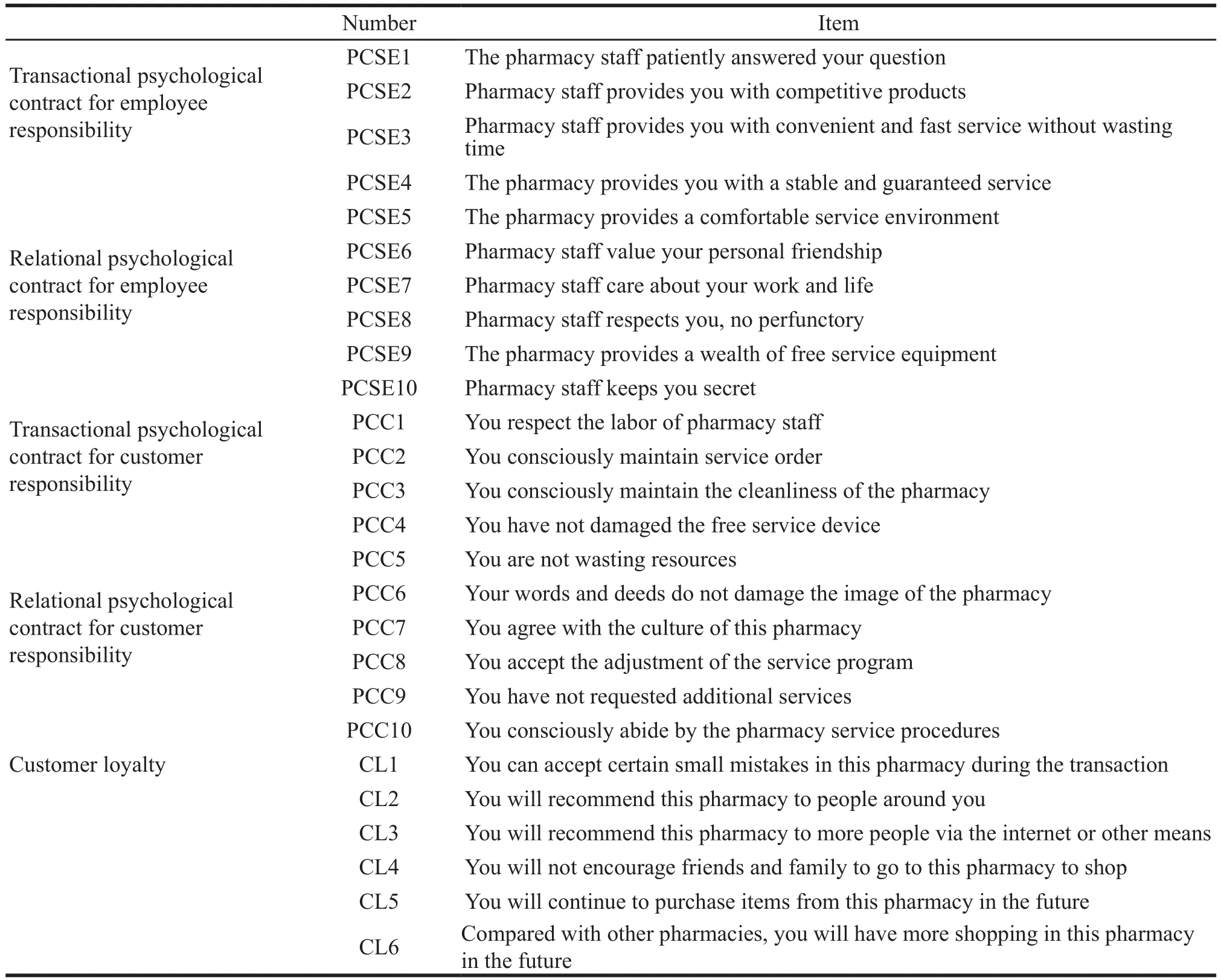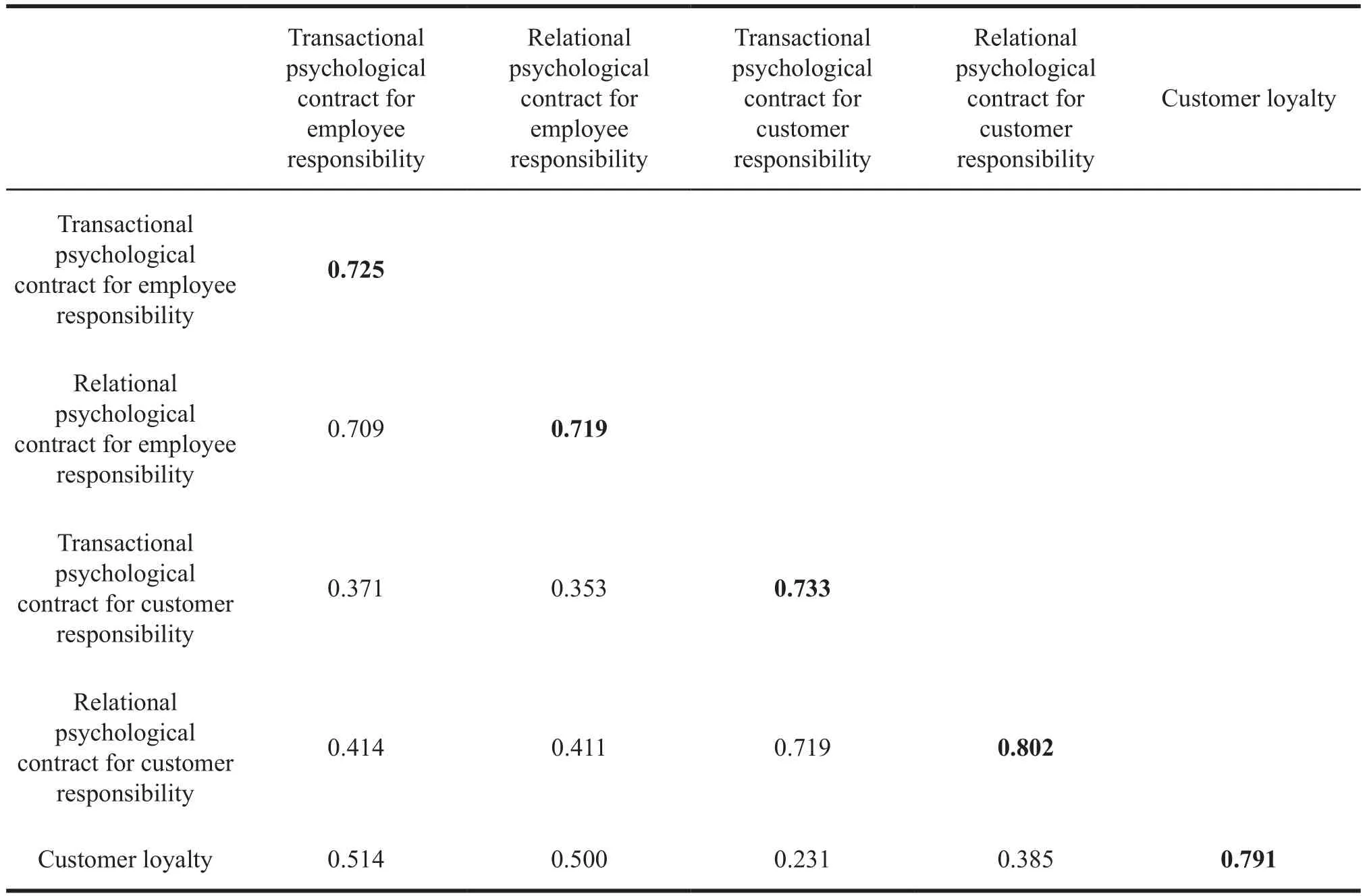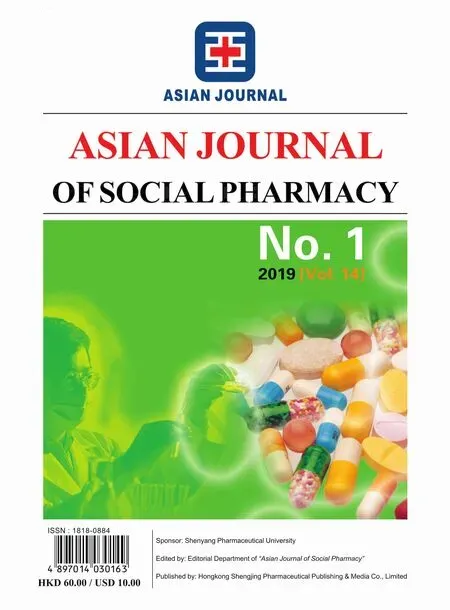lnf l uence of Psychological Contract on Customer Loyalty to Drugstores
2019-05-27CuiJingFanGuangwei
Cui Jing, Fan Guangwei*
(School of Business Administration, Shenyang Pharmaceutical University, Shenyang 110016, China)
Abstract Objective To discuss the in fl uence of the two-way psychological contract on customer loyalty to drugstores, and to put forward some suggestions for managers of drugstores to improve the customer loyalty based on the facts that drugstores have to give emphasis to such problems as how to keep their customers and improve customer loyalty due to the influence factors, such as the rich channels of drug purchase, the individualization of the demands for drug purchase and the strict requirements for the quality of service on the basis of psychological contract theory. Methods A total of 241 valid questionnaires were distributed in Shenyang to collect data and the data was analyzed by SPSS 24.0. Results and Conclusion The data analysis show that the transaction type and relational psychological contract of both drugstore employee's and customer's responsibility performance have signi fi cant in fl uence on customers loyalty, and the transaction psychological contract of employee's responsibility performance has the greatest impact on customers loyalty. Therefore, to improve customer loyalty, drugstores should provide reasonable services on the basis of satisfying the customers' psychological contract, and actively guide the customers to ful fi ll their own responsibility so as to increase sales.
Keywords: customer psychological contracts; customer loyalty; drugstore
According to the data on the off i cial website of the China Food and Drug Administration, as of the end of November 2017, there were about 470,000 licensed pharmaceutical enterprises in China,including 5,409 retail chain enterprises with 229,000 retail chain stores. Compared with 2016, the number of drug retail chain enterprises decreased by 3.55%,while the number of drug retail chain stores increased by 3.75%[1-2].
Investigating the reasons, we found that many small and medium-sized pharmacies simply copy and expand blindly, and they were unable to provide good services for customers. Therefore, it is hard to cultivate truly loyal customers, resulting in a large loss of customers[3]. As is known to all, loyal customers not only voluntarily repeat consumption for many times, which brings better economic benefits to the enterprise, but also help the enterprise carry out publicity and inspire people around to experience services and buy goods. As a result, improving customer loyalty is one of the urgent problems that drugstores need to solve.
In addition to hospital pharmacies and online pharmacies, traditional pharmacies are the most direct way for customers to obtain drugs. When buying medicine in drugstores, customers not only need
reasonable price and convenient service, but also the trustworthy goods, professional guidance and perfect after-sales service. Obviously, if customers' inner standards for drugstores are met, they will go to a certain drugstore for consumption to meet their demands. That is,drugstores reach an invisible “contract” with customers,and that's the customer's psychological contract with the traditional pharmacy[4]. The inf l uence of customer psychological contract on customer loyalty has been conf i rmed in the catering industry, tourism and other service industries. However, the existing literature has not studied whether and to what extent it affects the traditional drugstores. In addition, in previous researches on customer psychological contract,most of them only considered customers' unilateral perception of the responsibility of enterprises and their employees, and they did not take customers'own responsibility into consideration. Based on the above two reasons, this paper explores the structure of two-way psychological contract between customer perception of corporate responsibility and customer's responsibility and their impact on customer loyalty in the context of traditional pharmacy. Based on this psychological contract theory, we put forward some recommendations for the management of traditional pharmacies.
1 Theoretical basis and research hypothesis
1.1 Theoretical basis
1.1.1 Psychological contract
Argyris fi rst described the relationship between bosses and employees in the factory as “psychological contract of work”[5]. Later, scholars represented by guest believed that psychological contract was the subjective understanding of self-responsibility by both employees and employers[6]. However, scholars represented by Rousseau defined psychological contract as employees' unilateral perception of selfresponsibility[7]. In the real marketing, Luo Haicheng,a domestic scholar used the latter's point of view to define it as the customer's perception of the responsibility of the service enterprise[4], and divided the psychological contract into transaction type and relationship type in the empirical research. According to the particularity of the banking service industry,Yang Lin used the two-way psychological contract to define it as the belief generated by the perception of the responsibility of both customers and service companies[8]. Because of the similarities between the banking industry and traditional pharmacies,this paper draws on Yang Lin's point of view and def i nes the customer's psychological contract as: the belief that the customer has a service commitment to the pharmacy and the pharmacy's belief that the customer consciously fulfills the responsibility. The psychological contract studied in this article contains pharmacy staff to provide the required services to meet the customer's needs and customers to fulfill their responsibilities.
1.1.2 Customer loyalty
In the academic world, Copeland and Churchill first proposed the concept of customer loyalty[9]. Blattbegr and Subrata used the purchase ratio to measure customer loyalty[10]. Subsequently,many scholars believe that repeated purchase behavior does not necessarily represent customer preferences, and loyalty should also be manifested in a high psychological preference for enterprises.As a result, Dick and Basu defined customer's continuous repetitive purchase commitment as customer loyalty[11].
In explaining the meaning of customer loyalty,Yan Haoren thought it should include both behavior loyalty of repeated purchases and attitude loyalty of continuous preference for purchases[12]. Based on the above, this paper adopts the viewpoints of Dick,Basu[11]and Yan Haoren[12], and combines with the features of traditional pharmacies to def i ne customer loyalty as: Customer preferred attitude towards traditional pharmacy and accompanying continuous consumption behavior.
1.1.3 Research on the relationship between customer psychological contract and customer loyalty
The first scholar in China who linked the customer's psychological contract with loyalty in the market is Luo Hacheng. He believed that the connection between customer psychological contract and customer loyalty was that both of them could be regarded as the customer's psychological activities[13]. Based on Robinson's proposal that commitment produces a psychological state[14], and loyalty is taken as the customer's inner promise to the enterprise, it can be concluded that customer loyalty is a deep reflection of the customer's psychological contract. Therefore, the relational and transactional psychological contracts can be divided into two dimensions. At the same time, employee responsibility performance and customer responsibility performance have an impact on customer loyalty. This paper mainly discusses the impact and the extent of impact.
1.2 Research hypothesis
The performance of employees' responsibilities and the implementation of their commitments have a direct impact on customers' perception and evaluation of the service of drugstores. Providing quality service for customers is of great significance to improve customer loyalty. When customers perceive that some short-term transaction services are in line with their inner expectations, such as: the merchant provides convenient and fast services, high-quality goods, etc.,they will feel satisfied and may choose to repeat the purchase or even recommend the enterprise to others.When the customer get a certain amount of longterm emotional care, such as employees caring about his work and life, attaching importance to personal friendship with him. Therefore, customer establishes personal relationship with the business, instead of transaction relationship. Then the customer can be attracted to the enterprise and make it a first choice.Both repeated purchase and first choice can reflect customer loyalty[14]. Based on this, the following two hypotheses are proposed.
H1: Customer perception of employee transactional psychological contract performance has a positive impact on customer loyalty.
H2: Customer perception of employee relational psychological contract has a positive effect on customer loyalty.
When an enterprise tries to provide customers with high-quality services and products, it hopes to be respected and recognized by customers, and it also expects customers to consciously fulf i ll corresponding responsibilities, which is a psychological contract for customers to perceive the fulfillment of their responsibilities[8]. After customers' identification with the service and culture of the enterprise, they will voluntarily abide by the arrangement of service procedures, and even consciously maintain the cleanliness and service order of the environment,which is the psychological contract of the transaction performed by customers themselves. The relationship psychological contract performed by the customer's responsibility means that when the customer's identification with the enterprise reaches the degree of preference, he will consciously maintain the image and culture of the enterprise. As mentioned above,customer loyalty is also a preference behavior and attitude orientation based on identity. Therefore, the following two hypotheses are proposed.
H3: Customer perception of customer transactional psychological contract has a positive effect on customer loyalty.
H4: Customer perception of customer relational psychological contract performance has a positive impact on customer loyalty.
2 Research design
2.1 Scale design
When designing the scale, we drew on the research of Yang Lin to make the customer psychological contract scale[8]. The customer loyalty scale was based on Fan Yuanyuan's research[15].After the initial design of the questionnaire, experts in relevant fi elds were invited to check the validity of the scale in terms of content, and 20 college students were asked to conduct pre-tests and initially complete the scale design. The items of the scale were all based on the Level 5 Likert scale, and Levels 1 through 5 indicated that they strongly disagree and agree very much. Each of the items was designed as a reverse item and was re-assigned during data analysis.This paper mainly includes two scales of customer psychological contract and customer loyalty.

Table 1 Summary of this scale
2.2 Questionnaire design
The design of the questionnaire mainly included three parts: the fi rst part was about guiding language and the actual consumption of drugstore customers.The purpose was to understand the shopping experience of the personnel on the test day, so as to better analyze the data. The second part was the scale,namely customer psychological contract scale and customer loyalty scale. The third part was personal information items, mainly including gender, age, and income etc.
When the initial questionnaire was formed, ten initial questionnaires were distributed to the customers of national university of pharmacy for pre-survey, and the statements of some items in the questionnaire were modif i ed according to the customer feedback to make it easier for the subjects to understand, and the formal questionnaire was formed fi nally.
2.3 Data collection
In this survey, a total of 290 paper questionnaires were collected, and some invalid questionnaires were removed. The exclusion principle was to eliminate all the questionnaires with the same option, or answering the questions in contradiction before and after, or the incomplete questionnaires. After elimination, 241 valid questionnaires were obtained, with an effective rate of 83.10%.
3 Data analysis and results
3.1 Analysis of reliability and validity
The effectiveness of this study was tested by factor analysis in SPSS. According to the load coefficient of the standardized factor, the AVE value was calculated as the average variance extraction of latent variables. The summary of reliability and validity test is shown in Table 2.
Table 2 shows that the standard load coeff i cient of each item is greater than 0.5, the alpha coeff i cient is greater than 0.8, the AVE value is greater than 0.5,and the CR value is greater than 0.8, indicating that the measured variables have passed the reliability and convergence validity test. If the square root of AVE value is greater than the correlation coefficient between latent variables, it can be considered that latent variables have good discriminant validity. As shown in Table 3, the correlation coeff i cient between all latent variables is less than the square root of AVE,so it has a good discriminative validity.

Table 3 Discrimination validity test
3.2 Hypothesis test
3.2.1 Correlation analysis
The relevant analysis is to measure whether there is a correlation between two variables, and it is usually measured by the Pearson correlation coefficient.From Table 3 we can see that the two dimensions of psychological contracts in the study of the staff and the customer's perspective, the relationship and the transaction four variables have a positive correlation with customer loyalty, and the relationship is relevant at level 0.01. The four hypotheses H1, H2, H3 and H4 in this paper are preliminarily verif i ed.
3.2.2 Regression analysis
According to the hypothesis of this paper, a linear regression model is established by taking the psychological contract of employee responsibility fulf i llment relationship and the psychological contract of employee responsibility fulfillment transaction as independent variables and customer loyalty as dependent variables. The adjusted R2is 0.265 and it has passed the F significance test. The specific coeff i cients of the model are shown in Table 4.
As can be seen from Table 4, both the transaction psychological contract and relational psychological contract coefficients performed by employees'responsibilities have passed the signif i cance test. And there is no multicollinearity. Therefore, it is verified that hypothesis H1 and H2, the customer perceived employee transactional psychological contract and relational psychological contract have a positive impact on customer loyalty. And the following regression equation can be obtained.
Customer loyalty =0.331* employee responsibility to fulfill the psychological contract of transaction + 0.228* employee responsibility to fulf i ll the psychological contract of relationship +1.47.

Table 4 Coeff i cient table of employee responsibility performance
Second, taking customer transaction psychological contract and customer psychological contract as the independent variable and the customer loyalty as the dependent variable, the linear regression analysis is made to get the adjusted R2that is 0.288,which has passed the test of significance F. The specif i c coeff i cient model is shown in Table 5.

Table 5 Coeff i cient table of customer responsibility performance
Table 5 shows that the regression coefficients of the two independent variables have passed the significance test, indicating that the dependent variables can be better explained. And there is no multicollinearity. Therefore, it is verified that hypothesis H3 and H4, the transactional and relational psychological contracts that customers perceive to fulfill their responsibilities have a positive impact on customer loyalty. And the following regression equation is obtained.
Customer loyalty =0.235* customer responsibility fulfillment transaction psychological contract +0.276* customer responsibility fulfillment relationship psychological contract +1.796.
4 Research conclusions and prospects
4.1 Research conclusions
Based on the review of the existing literature and combining the characteristics of traditional pharmacy industry and its market background, this paper explores the impact of customer psychological contract on customer loyalty. According to the questionnaire survey, the innovation lies in the study of two-way impact of customer psychological contract on customer loyalty that not only includes the responsibility fulfillment of pharmacy staff but also customer responsibility fulf i llment.
First, the customer's psychological contract of pharmacy is divided into employee responsibility performance and customer responsibility performance.Employee responsibility fulfillment is the psychological contract that the customer perceives pharmacy, including transactional psychological contract and relational psychological contract. But the customer responsibility performance is the psychological contract that customer perceives to pharmacy, including transactional psychological contract and relationship psychology contract.Secondly, both customer responsibility performance and employee responsibility performance have a signif i cant positive impact on customer loyalty. Among them, the employee's transactional psychological contract has the greatest impact on customer loyalty.
4.2 Management enlightenment
Based on the customer psychological contract mechanism, drugstores should do the following to improve customer loyalty.
First of all, from the perspective of customers,before the psychological contract of employee responsibility fulfillment has been established,drugstores should take the needs of customers as the guide, and they should not provide unnecessary products or services to meet the initial expectations of customers. After the establishment of psychological contract, drugstores should provide perfect aftersales service to enhance customer loyalty. After repeated purchase from customers, drugstores should seriously address the new requirements put forward by customers. After customer loyalty is completely established, relationship management should be strengthened to enhance emotional communication with customers so that personal friendship with customers can be developed.
Secondly, from the perspective of pharmacy,based on the customer duty, pharmacy should guide customers to fulfill some responsibilities and obligations, such as avoiding the waste of resources,not damaging service equipment. Therefore, pharmacy can set up obvious guiding words and reminders so that customers will recognize the contract and abide by the regulations made by pharmacy, which can help pharmacy reduce expenses and provide better service to customers.
4.3 Limitations and prospects of the study
This paper still has some research limitations.First, based on the characteristics of the questionnaire survey, certain deviations occur although the questionnaire options and answer requirements have given to the subjects. This results in some impact on the fi nal research results. Secondly, due to the limited number of samples recovered, the results cannot have a high representativeness and universality. And the survey area is only in Shenyang, which means the regional limitations.
The follow-up research can focus on the influence of customer psychological contract satisfaction on customer loyalty, particularly the influence on attitude loyalty and behavior loyalty.Secondly, a variety of survey methods can be adopted to investigate more samples and collect more data to reduce the error. Finally, the two-way customer psychological contract mechanism can be applied to more fi elds to solve more problems in the future.
杂志排行
亚洲社会药学杂志的其它文章
- Information for Authors
- Biopharmaceutical Industrial Zone in the United States:Development Experience and Its Enlightenment
- Import of Health care Products in China: Current Status and Countermeasures
- Research on Protection of the Interests of Generic Drug Companies in the Drug-Patent Linkage System Based on Cournot Model
- Research on Drug-Patent Linkage System under the New Situation
